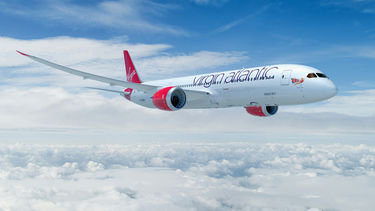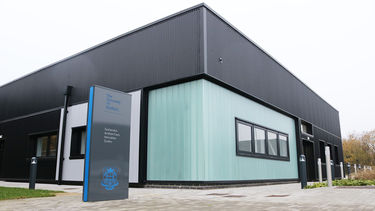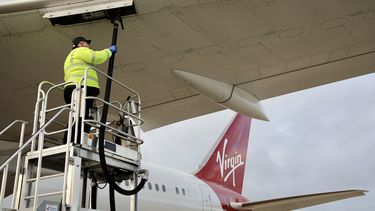Historic Milestone: World-First Transatlantic Flight Powered by Sustainable Aviation Fuel Takes Off
A historic transatlantic flight using 100 per cent sustainable aviation fuel has taken off today (28 November 2023) with the help of engineers from the University of Sheffield.
Flight100, by Virgin Atlantic, marks a major milestone in the development of sustainable aviation fuels, as the first commercial airline to use the replacement for jet fuel to fly across the Atlantic. The historic flight is an important step in tackling aviation’s biggest challenge – decarbonisation.
Having departed from London Heathrow this morning, the flight is now heading to New York JFK, demonstrating the potential to use SAF on long haul flights.
The flight follows more than a year of collaboration between a Virgin Atlantic-led consortium that includes the University of Sheffield, Imperial College London, Boeing, Rolls-Royce, BP, and others, and has been partly funded by the UK’s Department of Transport.
Researchers from the University of Sheffield have worked closely with their peers at Imperial College London to test and assess the fuel for the flight. The team measured particulate matter emitted via a smaller-scale aircraft engine to confirm that sustainable aviation fuel reduces the amount of carbon dioxide emissions by up to 70 per cent compared to traditional jet fuel.
The University of Sheffield has a SAF research and development facility – the first of its kind in the UK – where new fuels can be developed, tested and certified all in one place. The facility is based in the University of Sheffield Innovation District – home to the University’s world class R&D facilities, such as Factory 2050, that collaborate with industry to drive innovation in areas such as advanced manufacturing, aerospace and new low-carbon technologies.
Professor Mohamed Pourkashanian, Head of the University of Sheffield Energy Institute and Sheffield’s lead on the flight, said: “It has been a privilege for the University of Sheffield to be part of the truly momentous Flight100.
“The facilities we have at Sheffield – including our Sustainable Aviation Fuels Innovation Centre – are the first of their kind in the UK, so we are thrilled to have been involved in the testing of the emissions profile of the fuel used in this flight, proving that SAF reduces the impact of flying on the planet.
“Joining world-renowned partners like Virgin Atlantic, Boeing and Rolls Royce, the University of Sheffield’s work in this world-first flight means South Yorkshire’s expertise in advanced manufacturing and aerospace innovation has a place on the international stage.
“We are very proud to be part of this excellent project and hope that it brings with it a future of low/zero-carbon, safe air travel.”
SAF has a fundamental role to play in aviation’s decarbonisation and pathway to net zero 2050. SAFs look, smell and function like traditional jet fuel, meaning they can be used in existing aircraft without modifications. Made from waste products, SAFs can be used today in existing engines, airframes and fuel infrastructure. But currently SAF represents less than 0.1 per cent of global jet fuel volumes, and current fuel standards allow for just a 50 per cent SAF blend in commercial jet engines. The success of Flight100 aims to see this increase.
Shai Weiss, Chief Executive Officer, Virgin Atlantic said: “Flight100 marks an important milestone in aviation’s biggest challenge – decarbonisation. It’s taken radical collaboration and we’re proud to have reached this point, but we need to push further.
“Alongside fleet transformation, sustainable aviation fuel is the most readily available way for the industry to decarbonise, but we’re facing a lack of supply and price support. For long haul aviation to use 100 per cent SAF on every flight, we need to see action towards creating a UK SAF industry. Flight100 proves that the SAF uptake challenge isn’t operational – if we can make it, we can fly it.”
Dr Marc Stettler, from Imperial’s Department of Civil and Environmental Engineering, said: “This is science in action – a unique opportunity to gather experimental data and test SAF use at scale. Although only one data point, Flight100 paves the way for gathering more evidence and ultimately working towards a future of more sustainable flying.”
The University of Sheffield’s Sustainable Aviation Fuels Innovation Centre (SAF-IC) can carry out pre-screening of SAFs at its world-class fuel testing lab. The facility can test and validate new fuels, giving the UK with much-needed testing capabilities to facilitate ASTM approvals and bring new SAF fuels to the market.
Earlier this month, the University of Sheffield broke ground on a new innovation facility at its Advanced Manufacturing Research Centre (AMRC) and research project led by global aerospace company Boeing.
The Composites at Speed and Scale (COMPASS) research facility, next to the AMRC’s Factory 2050, will house a Boeing-led project dedicated to developing and testing new technologies needed to meet future demand for lighter commercial aircraft. The facility will create jobs, bring investment and drive innovation and growth, but also play a major role in helping to reduce the environmental impact of commercial aviation by making planes lighter.
The transatlantic SAF flight together with the University of Sheffield’s R&D facilities in its innovation district on the Sheffield and Rotherham border are helping put South Yorkshire at the forefront of efforts to make the aviation industry more sustainable.





